 Petzlover
Petzlover King Charles Spaniel is originated from United Kingdom but Slovak Cuvac is originated from Slovakia. King Charles Spaniel may grow 42 cm / 16 inches shorter than Slovak Cuvac. King Charles Spaniel may weigh 36 kg / 79 pounds lesser than Slovak Cuvac. Both King Charles Spaniel and Slovak Cuvac has almost same life span. Both King Charles Spaniel and Slovak Cuvac has almost same litter size. Both King Charles Spaniel and Slovak Cuvac requires Moderate Maintenance.
King Charles Spaniel is originated from United Kingdom but Slovak Cuvac is originated from Slovakia. King Charles Spaniel may grow 42 cm / 16 inches shorter than Slovak Cuvac. King Charles Spaniel may weigh 36 kg / 79 pounds lesser than Slovak Cuvac. Both King Charles Spaniel and Slovak Cuvac has almost same life span. Both King Charles Spaniel and Slovak Cuvac has almost same litter size. Both King Charles Spaniel and Slovak Cuvac requires Moderate Maintenance.
 Classified as a toy breed, the King Charles Spaniel is a small, pure breed dog that originated in the United Kingdom. The dog was named after King Charles II of Britain.
Classified as a toy breed, the King Charles Spaniel is a small, pure breed dog that originated in the United Kingdom. The dog was named after King Charles II of Britain.
The dog actually has quite a long, illustrious history. People mistake them for the Cavalier King Charles Spaniel, but they are 2 different breeds, just sharing the same coat colors.The King Charles Spaniel was crossbred with the Pug early in the 19th century to shorten the length of the dog's nose.
With a face similar to that of the Pug, it is thought that these toy spaniels may have originated in the Far East.The earliest recorded pictures of toy spaniels in England were in paintings of Queen Mary 1 and King Philip.
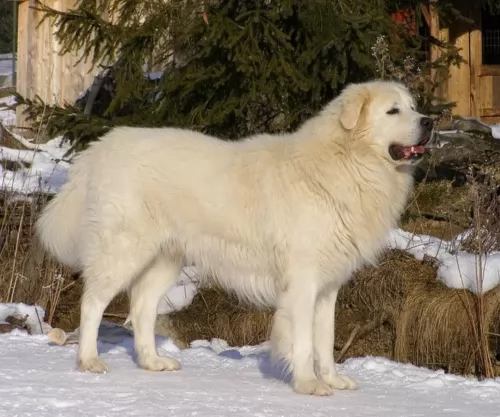 Looking quite a bit like the Pyrenean Mountain Dog, the Slovak Cuvac is a large dog that has served as a guard dog. The Slovensky Cuvac is still used on sheep farms as he isn’t afraid of wolves and bears and will take them on if needs be.
Looking quite a bit like the Pyrenean Mountain Dog, the Slovak Cuvac is a large dog that has served as a guard dog. The Slovensky Cuvac is still used on sheep farms as he isn’t afraid of wolves and bears and will take them on if needs be.
Records of this dog have been kept since the 17th century already, and when the breed started dying out, a certain Dr Antonin Hruza put in efforts to revive the dog.
The registered breeding of the Slovensky Cuvac was established in Czechoslovakia and a club for the dog was established in 1933. A written standard was established in 1964. The dog is not recognized by the Fédération Cynologique Internationale.
 The King Charles Spaniel is a medium sized dog that stands at roughly 23 – 28cm and weighs anything from 3 to 8kg. He is smaller than the Cavalier King Charles.
The King Charles Spaniel is a medium sized dog that stands at roughly 23 – 28cm and weighs anything from 3 to 8kg. He is smaller than the Cavalier King Charles.
He has a long coat which can be white, black and tan or a reddish-brown color. He has a domed head with a short, turned up nose and 'squashed' face similar to the pug. The eyes are large and dark and also protruding. The ears are set low and are long and floppy and the tail, once docked, is now left long and feathery.
Friendly, while being somewhat reserved, the King Charles Spaniel is looked upon as a lap dog as he loves to spend time indoors with his human family.
He isn't particularly energetic, but will still need some exercise like ball games and going on a walk. With training and socialization he becomes quiet and obedient and is known as a popular therapy dog. They are kind and loving with kids and pets in the home.
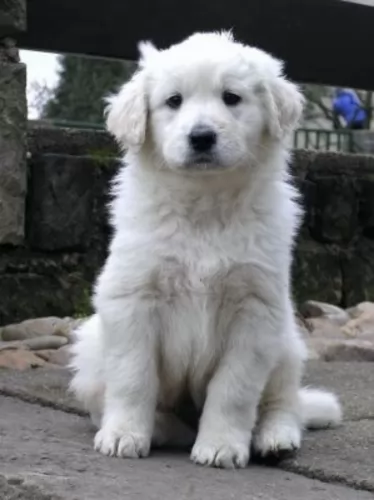 This is a large dog standing at between 59 and 70cm in height and weighing between 31 and 44kg.
This is a large dog standing at between 59 and 70cm in height and weighing between 31 and 44kg.
The neck is broad and has quite a bit of fur around it. The head is large, the eyes dark brown, the double coat is white and thick and medium length. The eyes are brown, the ears medium length and floppy and the tail long and furry.
This is a robust dog, used to spending time outdoors keeping watch over livestock. When he is invited into the home, he is gentle and well behaved, more so when he has been trained and socialized.
He is loving and loyal towards his human family and will get on well with children in the home. He isn’t the brightest dog but you can still have him trained.
 Your King Charles Spaniel is such a joy to have in the home and because he is intelligent he will easily learn some simple commands too.
Your King Charles Spaniel is such a joy to have in the home and because he is intelligent he will easily learn some simple commands too.
He wants to please you and be with you wherever you go. He is a social dog and thrives on your attention, and if you open your home and your heart to this sweet dog, you’re going to have a devoted, loving, loyal friend beside you every day.
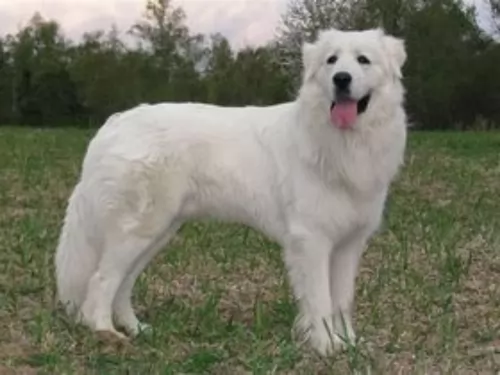 Your playful Slovak Cuvac is an affectionate dog, wanting nothing more than to be totally involved in his family’s life.
Your playful Slovak Cuvac is an affectionate dog, wanting nothing more than to be totally involved in his family’s life.
He is social and loving and also makes an excellent watchdog. He’s a big dog so think carefully before you bring him into your home. Many dog owners like the look of a big dog and forget that it costs a lot of money to feed a big dog and to pay for vet fees.
This big dog is wanting to be part of your family and not just to be discarded when you find that he is costing you too much.
 The eye problems that you might need to know about with a King Charles Spaniel are entropian, cataracts and corneal dystrophy.
The eye problems that you might need to know about with a King Charles Spaniel are entropian, cataracts and corneal dystrophy.
Heart conditions could include mitral valve disease where the blood flows backwards through the chambers of the heart, leading to congestive heart failure.
The King Charles Spaniel is a brachycephalic breed and these dogs can have upper airway problems. Breathing difficulties can also occur because of an abnormally small windpipe which is a characteristic common to brachycephalic breeds. You may notice rapid breathing with your dog , snoring, frequent panting, coughing and difficulty with swallowing.
As a dog owner, you have a responsibility to your pet. He will need to visit the veterinarian for all his puppy vaccinations as well as other vaccinations as an adult dog. He will also need to be de-wormed.
If you don’t want him or her becoming a parent, make sure your pet is neutered or spayed. If your pet is showing signs of an illness that he doesn’t get over quickly, get him immediately to the vet.
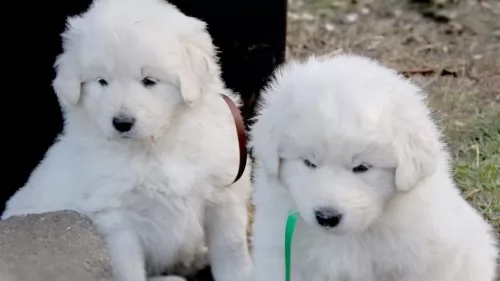 This is a healthy dog breed, but as with many large dogs, hip dysplasia is a threat. Hip dysplasia is always reason for concern as the condition can reduce a dog’s quality of life.
This is a healthy dog breed, but as with many large dogs, hip dysplasia is a threat. Hip dysplasia is always reason for concern as the condition can reduce a dog’s quality of life.
It is distressing seeing your once active pet becoming reluctant to play and move around.
Canine hip dysplasia is a common skeletal condition. It can strike any size dog but is more prevalent with large dogs. The ball and socket of the hip doesn’t fit properly and deterioration sets in resulting in loss of function of the joint.
You will need to get your dog to the vet who will perform a physical exam and discuss treatments to alleviate the pain your dog can experience.
 Your King Charles Spaniel has a long, silky coat that will require brushing twice a week to control shedding and keep his coat free of matting.
Your King Charles Spaniel has a long, silky coat that will require brushing twice a week to control shedding and keep his coat free of matting.
His nails will also require regular trimming to ensure they don’t hook on anything. His long ears are also prone to ear infection, so be sure to check them inside and out for ticks and fleas and to also remove excess wax and dirt.
Teeth should also be regularly brushed with canine toothbrush and toothpaste.
Be sure to keep your King Charles Spaniel content and healthy by ensuring he goes on a long walk and that you play with him to build a strong bond between you and to ensure he doesn’t become bored.
Excellent, quality food is important for your spaniel. The best dog food manufacturers have age- and breed-specific formulas and there is the perfect one for your King Charles Spaniel. Homemade food is also excellent for this dog and you can add some cooked chicken, brown rice and vegetables into his kibble as a nutritious treat.
Make sure your spaniel has a warm, dry, peaceful place to sleep and wash the bedding regularly to keep him healthy and happy.
Ensure he always has a cool, fresh bowl of drinking water nearby.
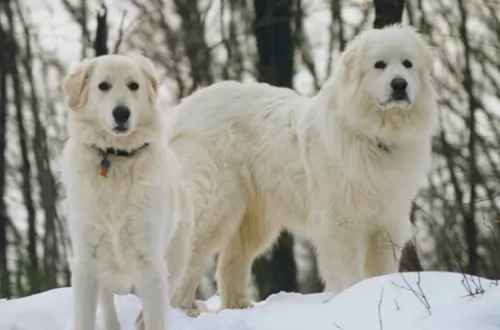 ◆The thick white hair will require regular grooming to keep it free from burrs and dirt. He sheds so this brushing will help him to look more groomed.
◆The thick white hair will require regular grooming to keep it free from burrs and dirt. He sheds so this brushing will help him to look more groomed.
◆The nails should be trimmed regularly and the ears too should be checked for redness and infection. You’ll need to look inside his mouth too as a rotting tooth can cause havoc within his body. A rotten tooth can also cause him tremendous pain and he has no way of telling you this.
◆Have your pet spayed or neutered if you don’t want any puppies. This is better for your dog’s health in the long run too.
◆Your Slovak Cuvac is going to need a lot of exercise as they have always been used to roaming the mountains watching over livestock.
◆This is a big dog so if you buy commercially manufactured food, make sure its for large, energetic dogs. There are good commercially manufactured dog foods on the market – just make sure you buy the best one for your pet to enhance health and longevity.
Try and give him some home made food too. Healthy food which won’t jeopardise his digestion is boiled chicken, brown rice or pasta and spinach, sweet potatoes and carrots. These can all be chopped up and small portions mixed into the dry kibble twice a week as a treat.
Try and include some raw meat occasionally. Your dog will thank you for not giving him exotic people foods which can do lots of harm. Ensure there is always a bowl of fresh, cool water within his reach.